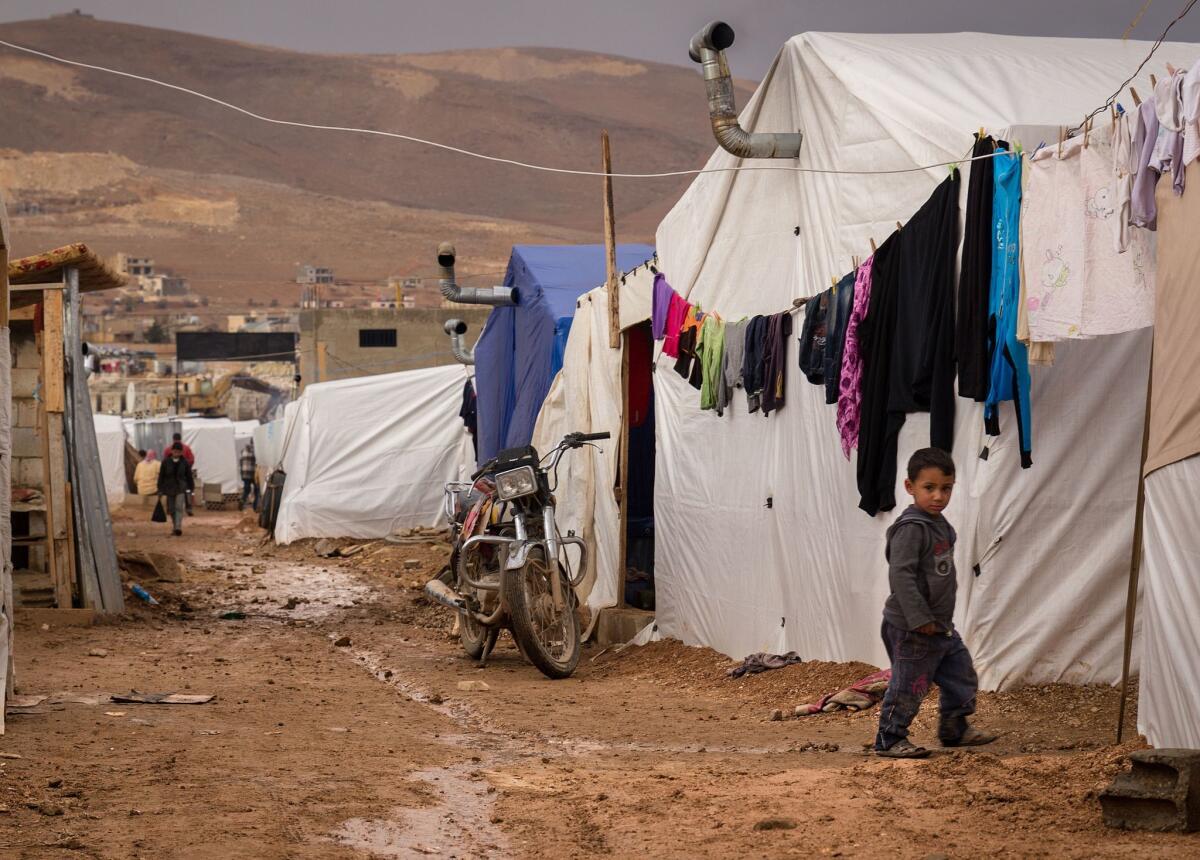U.N. halts food voucher aid for more than 1.7 million Syrian refugees

- Share via
Reporting from Beirut — The World Food Program has suspended emergency food vouchers to more than 1.7 million Syrian refugees on the eve of winter, setting the stage for “devastating” consequences, the organization said Monday.
“Without WFP vouchers, many families will go hungry,” the agency said in a statement issued in its headquarters in Rome. “For refugees already struggling to survive the harsh winter, the consequences of halting this assistance will be devastating.”
The United Nations food program has long provided vouchers that allow registered refugees to purchase foodstuffs in shops in Jordan, Lebanon, Turkey, Iraq and Egypt. The vouchers’ monetary value is loaded onto debit cards provided to the refugees.
But many financial commitments from nations and other donors remain unfulfilled, the group said, forcing it to suspend the program due to a $64-million shortfall in funds needed to support refugees in December.
“This was a very difficult decision. ... We had to postpone a delicate life-saving operation at the most difficult time of the year,” said Abeer Etefa, a World Food Program spokesman, reached by phone in Cairo. “We are feeding the most vulnerable and poorest of the Syrian refugees.”
------------
For the Record
Dec. 1, 2:15 p.m.: An earlier version of this post gave the last name of the World Food Program spokeswoman as Etafa rather than Etefa and wrongly stated her gender.
------------
More than 3 million Syrians have fled the nation since war erupted in 2011, according to the United Nations. More than double that number remain in Syria as internally displaced, the world body says.
The war, now in its fourth year, has cost some 200,000 lives, left many parts of Syria in ruins and divided the country into a patchwork of territory controlled by insurgent groups, including radical Islamists, and the Syrian government.
The food voucher suspension, aid workers say, comes at a time when refugees are not adequately prepared for the cold, especially in Lebanon and Jordan, where images depicting muddy pools and barefoot refugees propping up drenched tents have become a regular feature of the winter season. In years past, flooding also caused a sharp deterioration of hygienic conditions. Refugees in some informal settlements said they had to contend with rats.
The voucher initiative “was from the beginning a hand-to-mouth operation, and we were always hoping it [the funding] would come through,” said Etefa, the program spokesman. “We exhausted all channels of funding, including borrowing from other operations, but we’ve reached our limit.”
Host communities will also suffer from the loss of the vouchers, which has pumped some $800 million into area economies where refugees reside, according to the U.N.
“It deprives local vendors and retailers, since they have benefited greatly from the enormous spike in demand,” wrote Dr. Sean Yom, an assistant professor of political science at Temple University in Philadelphia.
For Lebanon and especially for Jordan, Yom wrote in an email, the loss will hit “the state where it can least afford to be hit -- in its purse.”
Bulos is a special correspondent. Times staff writer Patrick J. McDonnell contributed to this report.
Follow @mcdneville on Twitter for news out of Syria
More to Read
Sign up for Essential California
The most important California stories and recommendations in your inbox every morning.
You may occasionally receive promotional content from the Los Angeles Times.














